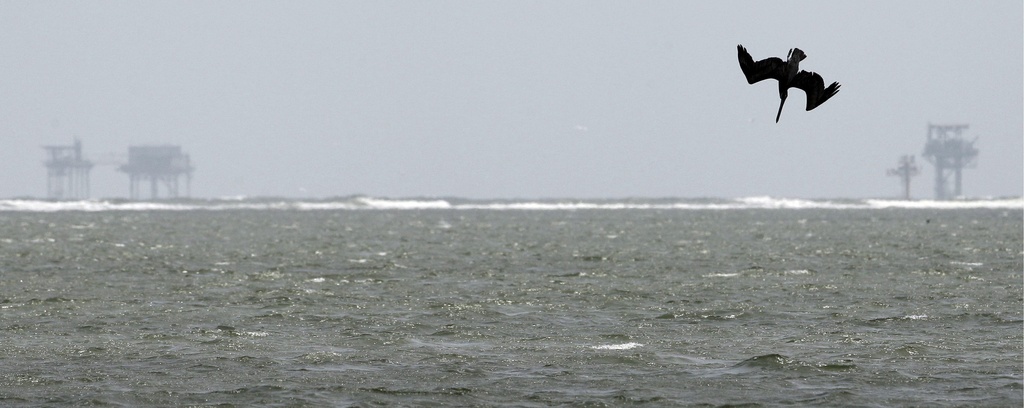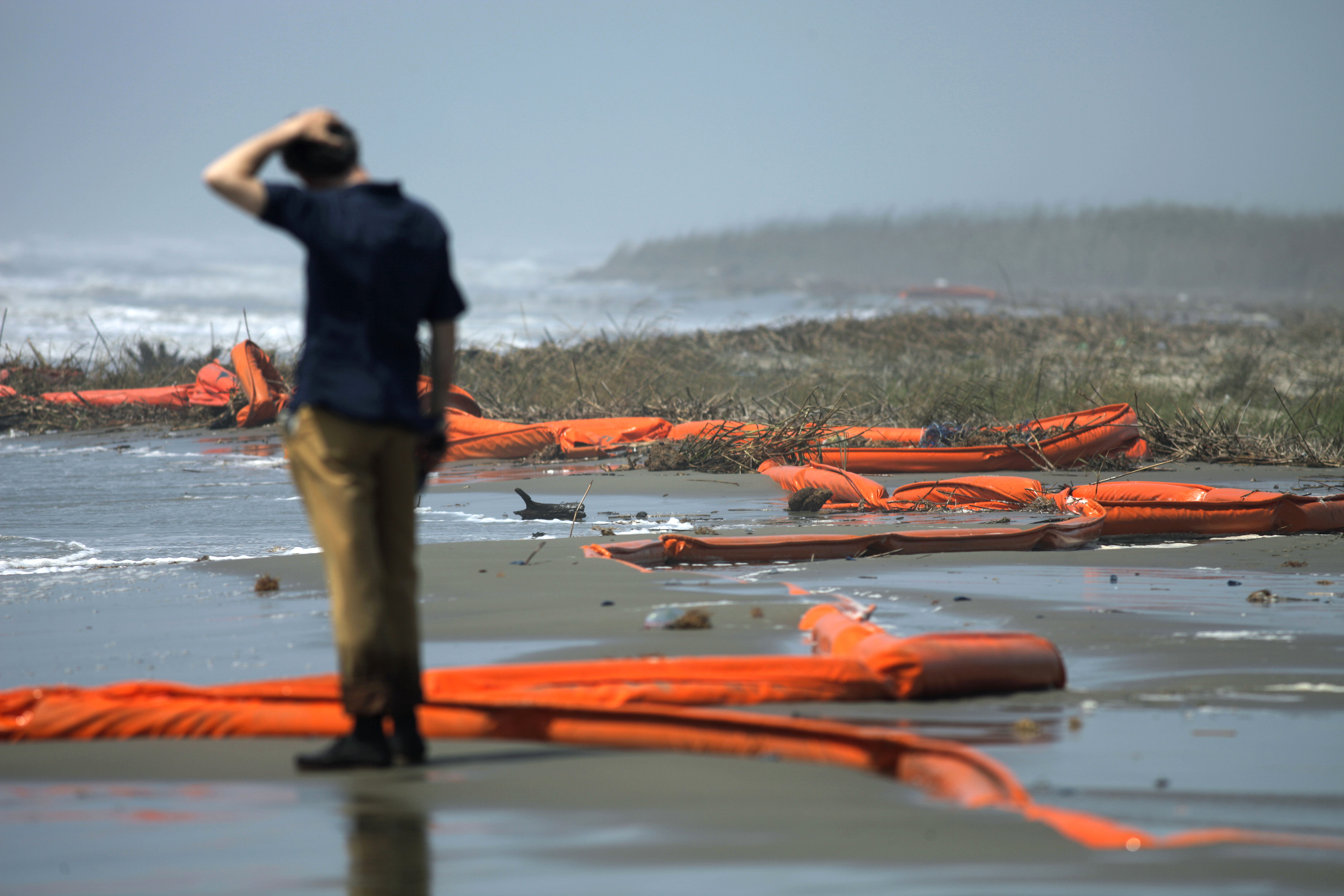Oil slick’s damage seeps into the unknown

The deep-sea waters will bear the brunt of the long-term damage caused by the oil spill in the Gulf of Mexico, a Swiss oceanographer fears.
Ahead of World Oceans Day on June 8, Silvia Frey, head of whale research at Oceancare, a Swiss non-profit organisation founded in 1989, tells swissinfo.ch that the Gulf Stream will carry contaminated fish and plankton towards Europe.
When ecosystems are destroyed inland or on the coast, it is directly visible. The biggest ecosystem in the world, however, is the ocean, where damage is not always so obvious. Scientists fear the situation is constantly growing worse.
President Barack Obama made his third visit to the Louisiana coast on the weekend—his second trip in a week—since the Deepwater Horizon oil rig exploded on April 20 and sank, killing 11 people.
Workers over the weekend installed a funnel over the broken well that collected about one million litres of oil in 24 hours. BP says that’s about half of what’s believed to be gushing out.
Waves of gooey tar blobs were washing ashore on the white sand beaches of northwestern Florida and nearby Alabama as a slick moved closer to shore. Receding tides left the sand stained orange.
Frey says there are no easy solutions but a large part of the planet’s food chain is in danger.
swissinfo.ch: How does an environmentally focused scientist from a landlocked country react to the natural catastrophe in the Gulf of Mexico?
Silvia Frey: On the one hand I feel powerless, but on the other I’m not giving up hope. Powerless because the leak still hasn’t been [completely] capped and the outlook for doing so is uncertain. But I’m hopeful that given all the available resources, we’ll be able to limit the damage somehow.
swissinfo.ch: How bad is this disaster? It’s not the first oil spill after all.
S.F.: This catastrophe is unique insofar as it’s the first time that oil has been flowing out so deep below the ocean surface [the sea floor gusher is some 1,500 metres below sea level and has leaked an estimated 83 million to 177 million litres of crude into the gulf. ]. It is also unique if you consider the amount of oil that’s got out. As a result, making an assessment is harder than before.
swissinfo.ch: What measures do you suggest?
S.F.: There are no easy solutions. The oil is getting into the ocean, a dynamic system. There are so many factors: what the weather’s like, the type of oil. Alongside capping the leak, the risk should be minimised that the oil reaches the coast. More damage would be done there than in the water. Cleaning up the coasts would be even harder.
swissinfo.ch: How serious does the damage look – in the short and long term, as well as regionally and globally?
S.F.: Everything depends on whether the leak can be capped or whether oil will continue to escape. The oil on the surface harms animals such as birds, fish, tortoises, dolphins and whales and so on, which are currently reproducing.
If eggs or fry are destroyed, an entire generation basically dies out. With animals that live for a long time, such as tortoises, this is fatal – especially when the species is endangered anyway. For example the red tuna, which is seriously overfished, is currently spawning in the Gulf.
But at 1,400 metres below sea level we can’t see the oil. The damage down there will probably never be visible.
In addition, fish or sperm whales die, sink and disappear from our field of vision. Oxygen-free areas could form, killing all animals there. Deep-sea fish can’t simply rise to the surface. As a result, various species disappear from the food chain.
We’re unfamiliar with such phenomena. The long-term damage is more likely to come from the deep. We also don’t know what it will mean for the bigger ecosystem.
swissinfo.ch: Europe is far away – landlocked Switzerland even more so. How will we be affected, other than seeing sushi supplies dwindle?
S.F.: We should have stopped eating tuna a long time ago! We’ve probably been indirectly contaminated. All those animals that are not killed by the oil are contaminated by it – this effect then spreads throughout the food chain.
And humans are at the top of this chain. We also absorb the contaminants of the food we take from the sea. The effect is similar to that with heavy metals, but we’ve known about that for longer.
People are also talking about the Gulf Stream, which as a north Atlantic ocean current carries warm water from the Gulf towards Europe. It’s hard to say whether it will also carry oil here. It’s not unlikely. But more likely is that large parts of the US East coast will be polluted.
But the Gulf Stream brings not only contaminated fish to us but also eggs and plankton. Now, if everything’s dead, there’s nothing for the Gulf Stream to bring and there won’t be any offspring.
swissinfo.ch: How much more can we expose the ocean to?
S.F.: We can answer this question very concretely. We depend massively on crude oil, not only for energy and transport, but also in the form of products, packaging and others. This catastrophe shows that for this we’re increasingly prepared to take risks.
Because our oil consumption is so high, we’re forced to run risks and go out into the ocean to extract it. The question is thus why we continue to demand this of the ocean and why we don’t convert to alternative forms of energy which are less risky and more environmentally friendly.
Alexander Künzle, swissinfo.ch (Translated from German by Thomas Stephens)
OceanCare is a Swiss non-profit organisation founded in 1989. It has a strong commitment to realistic and cooperative initiatives. The association works at national and international level in the areas of whaling, industrial fishing, environmental changes, seal hunting and dolphin captivity.
OceanCare is a partner of the UNEP/CMS Agreement on the Conservation of Cetaceans in the Black Sea, Mediterranean Sea and Contigous Atlantic Area (ACCOBAMS) and a member of the Cetacean Alliance, a not-for-profit network of nine non-governmental organisations committed to preserving marine biodiversity and reducing human impact on cetacean populations.

In compliance with the JTI standards
More: SWI swissinfo.ch certified by the Journalism Trust Initiative















You can find an overview of ongoing debates with our journalists here . Please join us!
If you want to start a conversation about a topic raised in this article or want to report factual errors, email us at english@swissinfo.ch.